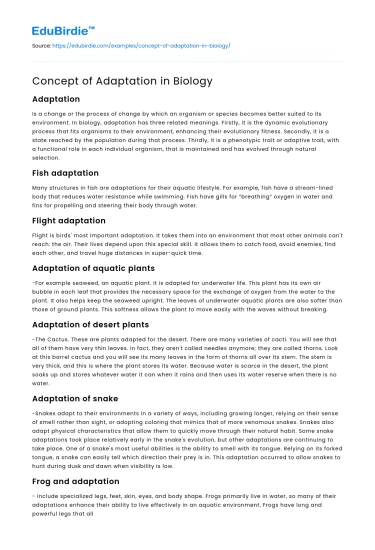Adaptation
Is a change or the process of change by which an organism or species becomes better suited to its environment. In biology, adaptation has three related meanings. Firstly, it is the dynamic evolutionary process that fits organisms to their environment, enhancing their evolutionary fitness. Secondly, it is a state reached by the population during that process. Thirdly, it is a phenotypic trait or adaptive trait, with a functional role in each individual organism, that is maintained and has evolved through natural selection.
Fish adaptation
Many structures in fish are adaptations for their aquatic lifestyle. For example, fish have a stream-lined body that reduces water resistance while swimming. Fish have gills for “breathing” oxygen in water and fins for propelling and steering their body through water.
Save your time!
We can take care of your essay
- Proper editing and formatting
- Free revision, title page, and bibliography
- Flexible prices and money-back guarantee
Flight adaptation
Flight is birds' most important adaptation. It takes them into an environment that most other animals can't reach: the air. Their lives depend upon this special skill. It allows them to catch food, avoid enemies, find each other, and travel huge distances in super-quick time.
Adaptation of aquatic plants
-For example seaweed, an aquatic plant. It is adapted for underwater life. This plant has its own air bubble in each leaf that provides the necessary space for the exchange of oxygen from the water to the plant. It also helps keep the seaweed upright. The leaves of underwater aquatic plants are also softer than those of ground plants. This softness allows the plant to move easily with the waves without breaking.
Adaptation of desert plants
-The Cactus. These are plants adapted for the desert. There are many varieties of cacti. You will see that all of them have very thin leaves. In fact, they aren't called needles anymore; they are called thorns. Look at this barrel cactus and you will see its many leaves in the form of thorns all over its stem. The stem is very thick, and this is where the plant stores its water. Because water is scarce in the desert, the plant soaks up and stores whatever water it can when it rains and then uses its water reserve when there is no water.
Adaptation of snake
-Snakes adapt to their environments in a variety of ways, including growing longer, relying on their sense of smell rather than sight, or adopting coloring that mimics that of more venomous snakes. Snakes also adapt physical characteristics that allow them to quickly move through their natural habit. Some snake adaptations took place relatively early in the snake's evolution, but other adaptations are continuing to take place. One of a snake's most useful abilities is the ability to smell with its tongue. Relying on its forked tongue, a snake can easily tell which direction their prey is in. This adaptation occurred to allow snakes to hunt during dusk and dawn when visibility is low.
Frog and adaptation
- include specialized legs, feet, skin, eyes, and body shape. Frogs primarily live in water, so many of their adaptations enhance their ability to live effectively in an aquatic environment. Frogs have long and powerful legs that allow them to jump and swim for long distances.
Adaptation of turtles
-Turtles spend most of their lives in water. They are adapted for aquatic life, with webbed feet or flippers and streamlined bodies. Sea turtles rarely leave the ocean, except to lay eggs in the sand. Freshwater turtles live in ponds and lakes, and they climb out of the water onto logs or rocks to bask in the warm sun.
Tortoises are land animals. Their feet are round and stumpy, adapted for walking on land. They also dig burrows with their strong forelimbs and slip underground when the sun gets too hot.
Adaptation of salmon
-The other highly notable adaptation in salmon is their gills. Atlantic Salmon have four sets of gills with specialized cells that allow them to migrate between salt and fresh water. The four sets also allow for the efficient dissolving of oxygen.
Adaptation of bat
-Bats have amazing adaptations, including being nocturnal to avoid predators and competition for food. To find food and fly safely, bats use echolocation where sound waves bounce off of objects. Bats have light bones and webbing that allows them to fly and cover during sleep
Adaptation of monkey
-Despite its lush vegetation and abundance of life, a jungle can be a harsh and inhospitable environment. Monkeys have adapted to thrive in jungles, developing physical characteristics, skill sets, and behavioral patterns designed specifically to help them survive in these dangerous habitats. Jungle monkeys have evolved structures and systems that allow them to conserve energy, locate food and locate each other in the jungle canopy.






 Stuck on your essay?
Stuck on your essay?

